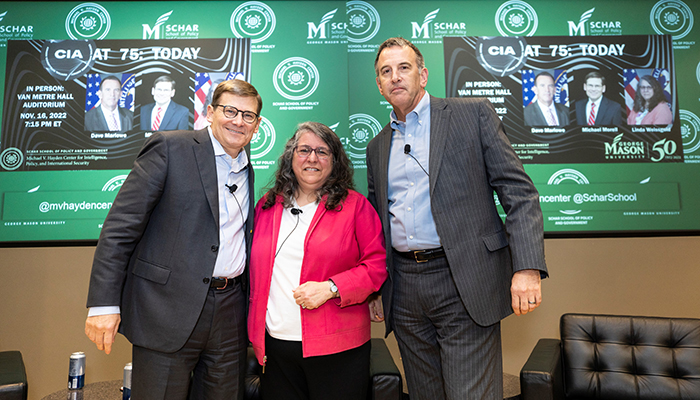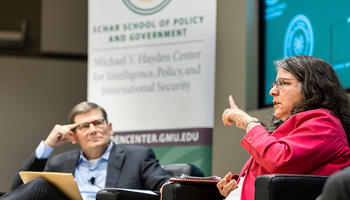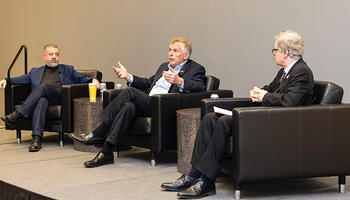In This Story


Two timely events scheduled back-to-back in adjacent halls made for a busy—and enthralling—night at George Mason University’s Mason Square on Wednesday, November 15.
First up was a postelection examination by two veteran politicians now on the Schar School of Policy and Government faculty: Former Virginia governor Terry McAuliffe (D) and longtime former Virginia delegate David Ramadan (R) presented insights as to the results of the midterm elections. The discussion, moderated by Schar School dean Mark J. Rozell, was part of the Pizza and Perspectives conversation series sponsored by University Life Arlington. About 30 students and community members attended the session—and enjoyed the pizza.
That discussion was followed in the adjacent Van Metre Hall auditorium by a first-ever chance to hear two sitting directors of major departments of the Central Intelligence Agency (CIA) divulge details about the inner workings of their units.
Hosted by the Schar School’s Michael V. Hayden Center for Intelligence, Policy, and International Security, some 210 Mason students, faculty, and staff members attended the conversation with Director of Analysis Linda Weissgold and Director of Operations Dave Marlowe.
The conversation was moderated by Hayden Center fellow and distinguished visiting professor Michael Morell, former acting and deputy director of the CIA, who opened the discussion with “the question everyone is dying to ask: Is working at the CIA like we see in the movies?”

“There are few cocktails and tuxedos in the CIA,” said Marlowe. “We are methodical, meticulous, we are deliverers. We play a long, careful game. Overall, we do things that are long term and are not a seven-minute scene in a movie. We take our job very seriously. We are not flashy like in the movies.”
Weissgold said working at the agency is about public service and not politics. “Not once in my career has anyone ever asked me what my political beliefs are, or have I ever asked,” she said. “It’s a special place…People cry when they leave the CIA.”
“I believe [agency employees] are genuinely motivated by patriotism,” said Marlowe. “And not the Fourth of July kind of patriotism.”
Those looking to join the agency, Weissgold said, should get their resumés in now for next year and not be deterred. “We hire all kinds of people and look for all kinds of things” to fill the wide variety of roles at the agency. (Some Mason students wasted no time: A team of CIA recruiters collected some 40 resumés at the event.)
As for current affairs, Weissgold and Marlowe offered brief insights as to developments between China and Taiwan, how the Iranians are treating protestors, and the ongoing conflict between Russia and Ukraine. Regarding North Korea, apparently there are difficulties in gaining information. “It’s the most closed society on the planet and even more so with the covid lockdown, Marlowe offered. “It’s an intelligence challenge.”
Among those in the audience were about a dozen members of the Schar School’s undergraduate Democracy Lab learning community who took advantage of the exclusive Mason event.
“This was a really cool opportunity to learn more about the CIA and the different aspects of it,” said Kirsten Knight, a freshman from Huntsville, Alabama. “They really go in depth, and you wouldn’t have the chance to hear that [elsewhere].”
—Additional reporting by Anduela Nika Johnson
